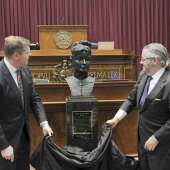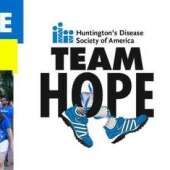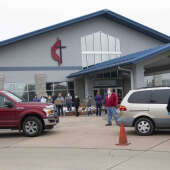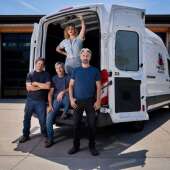Homecooked and The Read Read startups cinch 1st50K competition

Considering the stakes -- $50,000 in funding and mentorship -- happy hour is a breezy affair on the eve of Codefi's 1st50k startup competition.
The seven teams of founders crowd around the business incubator's sixth-floor offices, chatting over pilsner glasses and peering out over downtown Cape Girardeau, sizing up the town they'll end up calling home for the foreseeable future, if they win. Having spent the day mock-pitching to one another and fielding questions Shark Tank-style, they seem eager to relax. None, however, seem too worried about their prospects.
Some are too poised, still refining their best pitch lines with new acquaintances. Others, jet-lagged, are too exhausted to be properly nervous.
One founder, Hojung Kim, says that after seeing the competition, he has nothing to worry about.
"I mean, SHO.ai is gonna win," he says, nodding over his shoulder to a pair of other founders across the room and shrugging. "We're just happy to be here."
Slender, soft-spoken and perpetually tugging at the flop of dark hair on his forehead, Kim is more eager to discuss his competitors' ideas than he is to talk about his own startup, Homecooked. The other teams, he says, have better business models, longer resumes and employees older than 30.

By contrast, none of the Homecooked team is over 22. Just 21 himself, Kim says he's already picked up enough advice from the other competitors to call the trip a win. He'll use the insight to improve Homecooked, the social platform he co-founded to help people organize events in real-world kitchens to cook and dine together.
"It's something that I've struggled with, loneliness, and I think it's something that most people in my generation have had to deal with," he says. "So we're trying to fix that by getting people to cook together."
Kim says his experiences abroad -- some time he spent in cosmopolitan France and rural India in 2016 -- led him to view the American approach to food as "deeply weird," both in terms of what we eat and how we do it.
"It's becoming such an isolated practice in the U.S.," he says.

And he doesn't see existing social media helping.
"We suffer from unprecedented loneliness because, in a way, we live para-socially, where we don't need to interact with people to know what they're doing," he says. "I thought, as an adult, you just don't have a lot of friends. That's just the way it is. But that shouldn't be the way that it is."
That's the Homecooked project: trying to save our Facebook-and-fast-food-addled souls, one roasted salmon at a time. And that personal, humanitarian bent is at least in part what clinched the Homecooked team $50,000 at the close of the 1st50K competition.

The Read Read
But Kim and his partner Gabriel Oviawe weren't the only startup at the 1st50k trying to save the world. Nor were they the only ones to walk away with a giant check.
Harvard grad student Alex Tavares's startup, T-var EdTech, is working to end illiteracy through The Read Read, a tool designed by Tevares that helps students create and sound out words using talking, interchangeable tiles.
Tevares, who worked for years teaching disabled students to read, conceived the product after being disappointed by the existing tools and apps. They were too complex. They didn't work. So Tevares, with the help of colleagues and Harvard educators, developed a tool that not only would clearly articulate a letter's phonetics, but would be straightforward enough to be used without an instructor, if necessary.
While the startup's goals are to aid literacy training for a broad spectrum of students, The Read Read is also designed to teach blind students to read through the use of braille tiles. 1st50k judge and Codefi co-founder James Stapleton says by focusing on that more narrowly-defined problem, Tevares was able to more effectively rally support and resources to advance the business as a whole.
"That's one of the things we're looking at [in evaluating the pitches for the competition,] the founders' experience and their approach thus far," he says. "How have they been able to get the concept developed? That, in part, determines how effective we think that founding team can be ... [Tevares'] concept isn't limited to just vision-impaired young people. It's really all early childhood. That focus initially was strategic, and they planned to expand."
Plus, Tevares already has a working prototype of The Read Read. Stapleton says he could easily envision the ways in which the system could help students in Cape Girardeau.
"We have a high number of early childhood students in the pre-K to second or third grade in Cape Girardeau, especially in low-income families, who are woefully behind in reading," he says. "This is a tool we think could be used for those students to take that first step."
It is that mix of research and existing track record of success that convinced judges to name T-var EdTech one of this year's two winners. But if one award is granted on tangibles, Stapleton says the other is granted on a variable you can't quantify: passion.
There are all sorts of entrepreneurs, Stapleton says, who make a living solving problems they aren't particularly passionate about. But in his experience, he says it's difficult to muster the necessary dedication.
"The reality is that anyone who is going to be successful [in entrepreneurship,] you're going to wake up every day knowing you have 15 or 18 hours of work to do," he explains. "What's going to fuel you over that period of time?"
He says he sees the same je ne sais quoi in Kim and Oviawe that served past winners like Ann Butler so well in the long-term.
"There are plenty of examples of startups and technology-based companies being very successful under the management of young people who don't have much experience," he says. "[Developing talent] is part of what this competition is all about."

Reactions
When the winners are announced at the awards ceremony, Tevares accepts his check and stays at his table for the rest of the program. Kim and Oviawe, however, duck out into the hall, floating on a mixture of excitement and disbelief.
"We had no idea," Kim says to no one in particular. "I swear we had no idea. I said it yesterday, I thought Sho were gonna win ... I'm never going to forget that ... I have to call my dad."
Oviawe, for the most part, is quiet, saying later it didn't yet feel real.
"I guess we have to move to Missouri now," Kim tells his partner.
"How fast?"
"Like now."
As Kim busies himself swiping the Homecooked banner off the top of his booth for a keepsake, Oviawe seeks the bartender's advice.
"So hey," he says. "Um, well, what is rent like here?"































